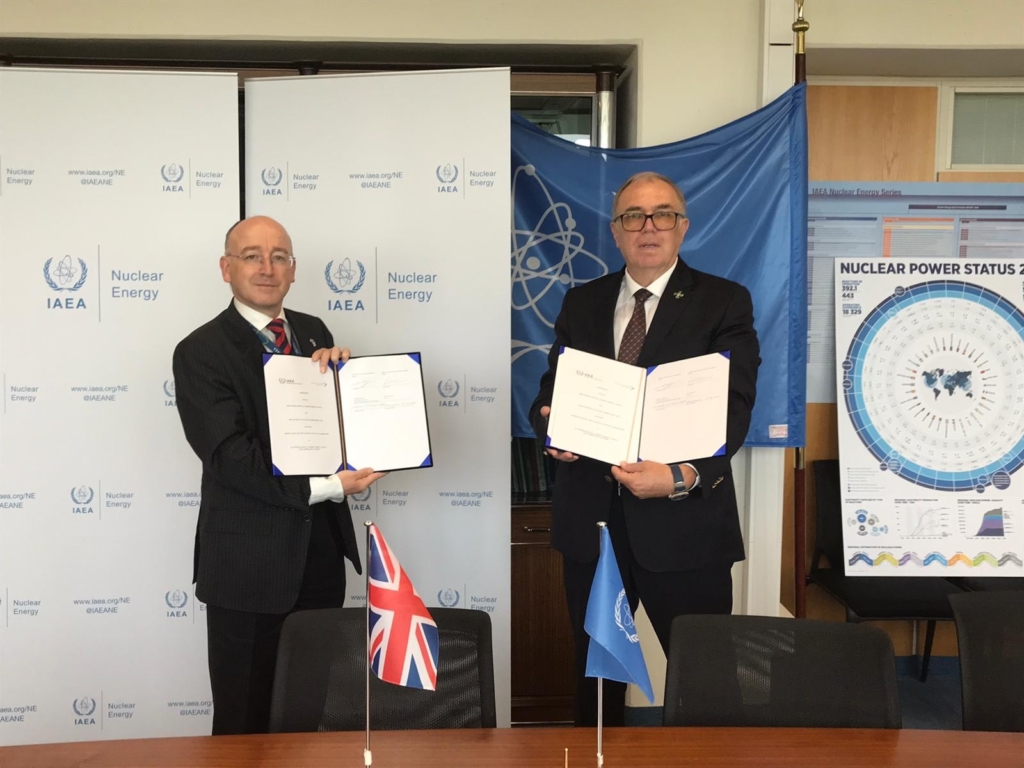Wednesday 23 September 2020
NNL Designated as the UK’s First IAEA Collaborating Centre
We are delighted to announce that the UK’s National Nuclear Laboratory has been formally designated as a Collaborating Centre by the IAEA. The announcement, which was welcomed by UK Business and Industry Minister Nadhim Zahawi, reflects increasing recognition of synergy between NNL’s emerging purpose of advancing nuclear technology for the benefit of society and that of the IAEA which strives to deliver the UN’s Sustainable Development Goals. It is particularly significant as this announcement represents the first formal designation of a UK institution as an IAEA Collaborating Centre.

The new Centre is the first IAEA Collaborating Centre on the Advanced Fuel Cycle anywhere in the world. As such, it will provide a global hub of expertise in a field of increasing importance as recognition grows of the vital role advanced nuclear technologies have to play in achieving deep decarbonisation of the energy system. It builds on the extensive work conducted by NNL and our UK partners in developing advanced nuclear technologies for a low carbon future, with particular focus on the UK commitment to achieve Net Zero carbon emissions by 2050. A key element of this is the iconic Government-funded Advanced Fuel Cycle Programme, led by NNL in partnership with BEIS, and engaging over 100 other organisations in the UK and globally. AFCP is part of the Government’s £500m Energy Innovation Programme – which includes the largest investment in UK nuclear research in a generation.
Through the Centre, the IAEA NNL and UK partners will collaborate on a number of topics relating to the development of advanced fuels and fuel cycles required to power the reactors of the future. The collaboration will place particular emphasis on the exchange of technical expertise between the UK, IAEA and Member State representatives, and in supporting the development of the next generation of experts.
UK Business and Industry Minister, Nadhim Zahawi, welcomed the announcement, saying:
“Advanced nuclear reactors are the next step in nuclear energy, helping us to tackle climate change and reach net zero emissions. This world-leading advanced fuel cycle centre will unlock thousands of green collar jobs and support our economic recovery as we build back greener from Covid-19”.
NNL’s Chief Executive Officer, Paul Howarth, commented:
“This development marks a very positive step for NNL and the UK – both in our relationship with IAEA, which continues to strengthen and flourish, and in establishing NNL’s role as a key representative body for the UK on the international stage in research and development. The Centre will build on an extensive body of work and capability which exists in NNL and across the UK, much of which has been enabled by the UK’s commitment to nuclear innovation via the Advanced Fuel Cycle Programme. We are keen and excited to build on this work as the Collaborating Centre progresses over the coming months and years.”
Ambassador Dr David Hall, UK Representative to IAEA and UK Governor to IAEA Board, commented:
“I think that this cooperation agreement is an embodiment of the United Kingdom’s commitment to the IAEA. This partnership between the IAEA and the United Kingdom is a tangible manifestation of what the United Kingdom can contribute to the IAEA’s work. The UK National Nuclear Laboratory is recognised as one of the ‘crown jewels’ of the UK civil nuclear sector, and I am sure that the collaboration between the UK-NNL and the IAEA will be the most useful and beneficial. It will serve as the flagship of the United Kingdom’s contributions to the IAEA.”
The Director of the Centre for NNL, Rob Whittleston, added:
“The UK has world leading scientific expertise and is pioneering the development of advanced technologies supported by a substantial programme of Government investment. The establishment of the IAEA Collaborating Centre provides a unique opportunity for the UK to further collaborate with our global partners, aligned to a common goal of deploying the reactors of the future – an essential component in the fight against climate change. We are absolutely delighted to be working in partnership with the IAEA on this agenda and in support of their objective of promoting the peaceful use of nuclear technology.”
The UK as a whole has a long history of work in the nuclear sector, a corresponding broad capability across the full fuel cycle and a long history of collaborative work with IAEA. NNL’s collaborative work with IAEA has been extending over recent years and includes:
- The signing of a “Practical Arrangements” document between the two organisations earlier this year, to underpin and facilitate closer cooperation between the UK and IAEA in support of the role of nuclear energy in delivering a sustainable future.
- NNL has provided substantial support to the UK Support Programme (UKSP), which recently marked its 40th anniversary – providing technical safeguards support from the UK to the IAEA
- NNL’s Preston Laboratory was also recently accredited as a member of the prestigious IAEA Network of Analytical Laboratories (NWAL)
- The two organisations – along with others – have been co-organisers of the Global Forum for Nuclear Innovation, the first of which was held in Seoul, South Korea in 2019, and the second of which will take place in London, UK in 2021.
An IAEA Collaborating Centre is an IAEA Member State institution, department or laboratory, which focuses on research, development and training and which has been designated by the IAEA to support their programmatic activities by implementing an agreed work plan. The Collaboration Centre scheme assists the IAEA in achieving its objective of promoting the peaceful uses of nuclear technology worldwide, and helps Member States strive towards achieving the targets identified in the United Nations’ Sustainable Development Goals.
